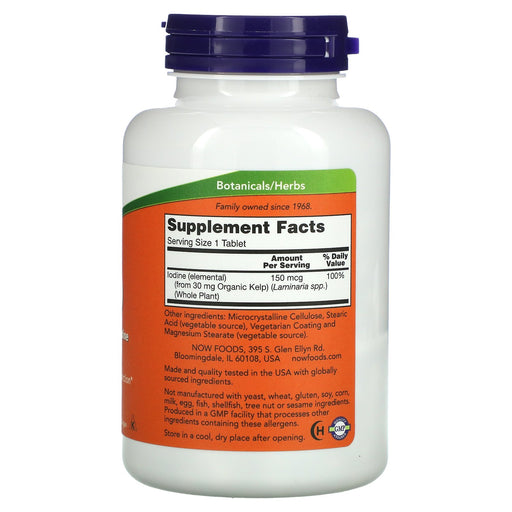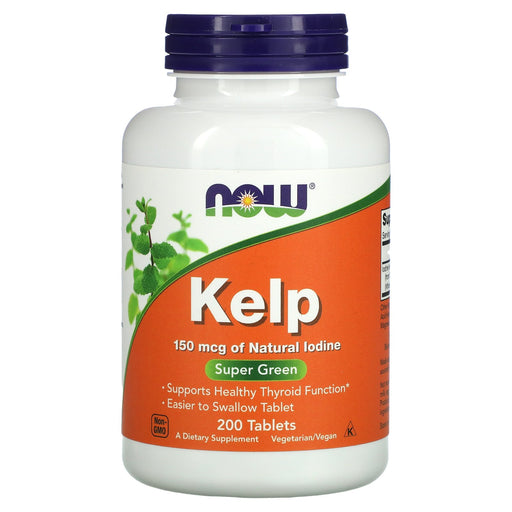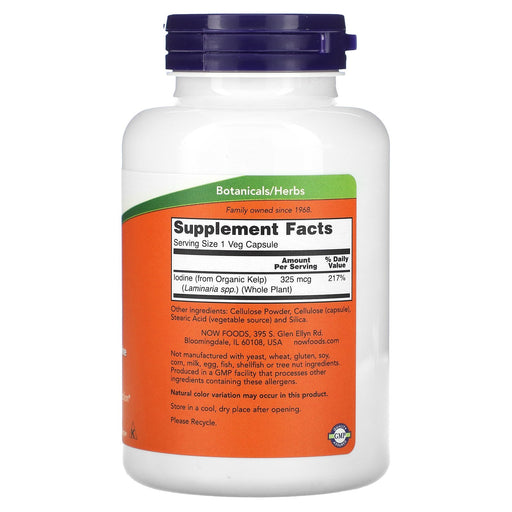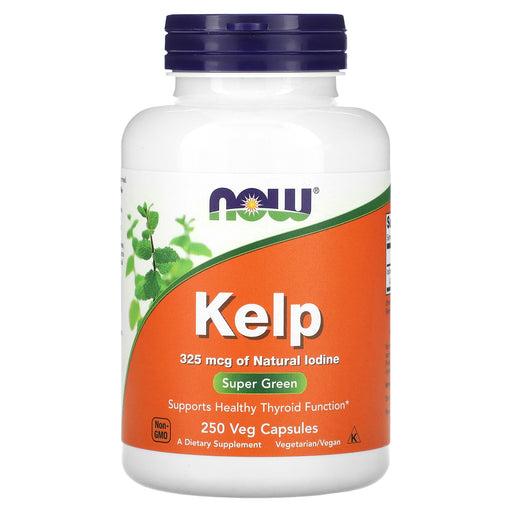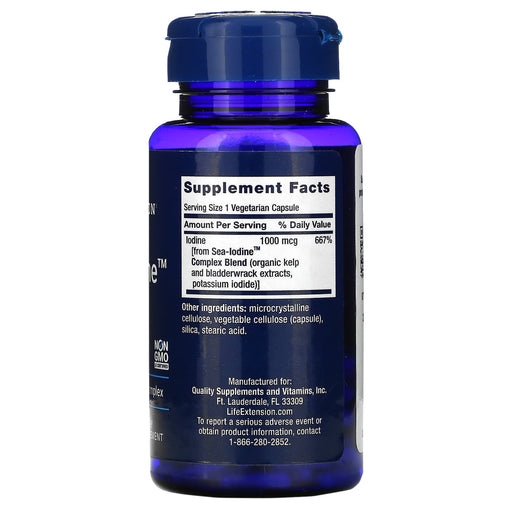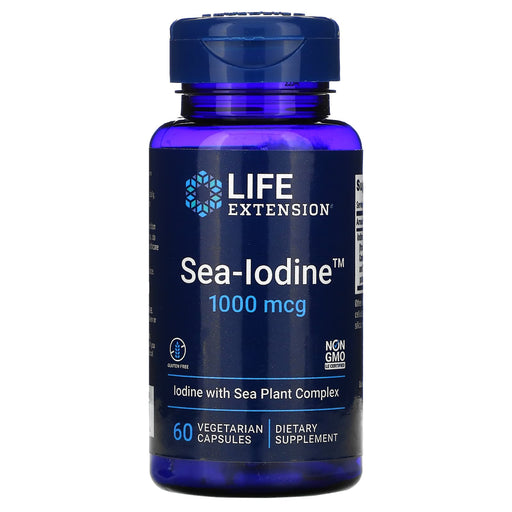
Harness the Power of the Sea with Kelp: Nutrient-Rich Supplements for Thyroid Health and Beyond
Kelp, a type of seaweed that grows in the nutrient-rich waters of the ocean, has been celebrated for centuries as a natural source of essential vitamins, minerals, and trace elements. In recent years, kelp supplements have gained popularity for their potential to support thyroid health, weight management, and overall wellness. By incorporating kelp into your daily nutrition regimen, you can tap into the remarkable benefits of this sea vegetable and promote optimal health from the inside out.
The Nutritional Powerhouse of Kelp
Kelp is a true superfood, packed with an impressive array of nutrients that are essential for various functions in the body. Some of the key nutritional components of kelp include:
- Iodine: Kelp is one of the richest natural sources of iodine, a trace element that is crucial for the production of thyroid hormones, which regulate metabolism, energy levels, and weight management.
- Vitamin K: This fat-soluble vitamin plays a vital role in blood clotting, bone health, and cardiovascular function, and is found in significant amounts in kelp.
- Folate: Kelp is a good source of folate, a B vitamin that is essential for DNA synthesis, red blood cell production, and fetal development during pregnancy.
- Magnesium: This essential mineral, found in kelp, supports bone health, muscle and nerve function, energy production, and stress management.
- Antioxidants: Kelp contains a variety of antioxidants, such as flavonoids and carotenoids, which help to protect cells from oxidative stress and support overall health and longevity.
The Benefits of Kelp Supplementation
Incorporating kelp supplements into your daily routine can offer a range of potential health benefits, including:
- Thyroid Support: The high iodine content in kelp can help to support healthy thyroid function, promoting optimal metabolism, energy levels, and weight management.
- Weight Management: By supporting thyroid health and metabolism, kelp supplements may assist in maintaining a healthy weight and body composition.
- Digestive Health: Kelp is a rich source of dietary fiber, which can help to promote regular bowel movements, support the growth of beneficial gut bacteria, and maintain overall digestive health.
- Bone Health: The vitamin K and magnesium found in kelp play important roles in maintaining strong, healthy bones and reducing the risk of osteoporosis.
- Cardiovascular Support: The antioxidants and minerals in kelp, such as magnesium and folate, can help to support cardiovascular health by promoting healthy blood pressure, circulation, and homocysteine levels.
Choosing the Right Kelp Supplement
When selecting a kelp supplement, it's essential to choose a high-quality product from a trusted source. Look for supplements that:
- Are sourced from clean, unpolluted waters to ensure purity and safety
- Undergo rigorous testing for contaminants, such as heavy metals and toxins
- Provide a standardized amount of iodine and other key nutrients
- Are manufactured by reputable companies with a commitment to quality and transparency
It's also important to consult with a healthcare professional before starting any new supplement regimen, especially if you have a pre-existing thyroid condition or are taking medications that may interact with iodine.
Related Vitamins and Supplements
While kelp is a nutritional powerhouse on its own, certain vitamins and supplements can complement its benefits and support overall health and well-being. Some relevant options to consider alongside kelp include:
- Selenium: This trace mineral works synergistically with iodine to support healthy thyroid function and acts as an antioxidant to protect cells from oxidative stress.
- Vitamin D: This essential vitamin supports immune function, bone health, and overall wellness, and can be particularly beneficial for those living in areas with limited sun exposure.
- Omega-3 Fatty Acids: These healthy fats, found in fish oil and algae supplements, support heart health, brain function, and a balanced inflammatory response, complementing the benefits of kelp.
- Probiotics: These beneficial bacteria support digestive health, immune function, and nutrient absorption, which can help to optimize the benefits of kelp and other nutrient-dense foods and supplements.
Experience the Sea's Bounty with Kelp Supplements
At Health Orchard, we are dedicated to providing our customers with the highest quality kelp supplements to support thyroid health, weight management, and overall wellness. Our carefully curated selection features kelp products from trusted brands, harvested from pristine waters and processed with strict quality control measures to ensure purity, potency, and safety.
Whether you're looking to support your metabolism, maintain a healthy weight, or promote overall health and vitality, our kelp supplement collection has the perfect product to meet your needs.
Witness the power of the sea and experience the transformative benefits of kelp for yourself. Browse our selection today and take the first step towards harnessing the nutrient-rich bounty of the ocean for your optimal health and well-being.
Frequently Asked Questions about Kelp
1. What does kelp supplement do?
Kelp supplements offer a range of potential health benefits due to their rich nutrient profile:
- Iodine source: Kelp is a natural source of iodine, which is essential for proper thyroid function and hormone production
- Antioxidants: Kelp contains antioxidants that help protect cells from oxidative stress and inflammation
- Mineral content: Kelp is rich in minerals like iron, calcium, magnesium, and potassium, which support various bodily functions
- Digestive health: The fiber content in kelp may help promote digestive health and regularity
- Weight management: Some studies suggest that kelp may help support weight loss by reducing fat absorption and increasing feelings of fullness.
2. Is kelp safe to take daily?
Kelp supplements are generally considered safe for most people when taken in appropriate doses. However, there are some precautions to consider:
- Iodine content: Kelp is rich in iodine, and excessive intake can lead to thyroid dysfunction. It's important to follow the recommended dosage and consult with a healthcare professional, especially if you have a pre-existing thyroid condition
- Heavy metal contamination: Some kelp supplements may contain heavy metals like arsenic, cadmium, or mercury, which can be harmful in high amounts. Choose reputable brands that test for contaminants
- Drug interactions: Kelp may interact with certain medications, such as blood thinners or thyroid hormone replacements. Consult with a healthcare professional if you are taking any medications
- Allergies: Some people may be allergic to kelp or other sea vegetables. Discontinue use if you experience any adverse reactions
3. What can kelp be used for?
Kelp supplements can be used for various health purposes, including:
- Thyroid support: Kelp's iodine content helps support healthy thyroid function and hormone production
- Nutritional support: Kelp is rich in vitamins, minerals, and antioxidants that contribute to overall health and well-being
- Digestive health: The fiber in kelp may help promote digestive regularity and support a healthy gut microbiome
- Weight management: Some studies suggest that kelp may help support weight loss efforts by reducing fat absorption and increasing satiety
- Skin health: The antioxidants and minerals in kelp may help support healthy skin, hair, and nails
- Bone health: Kelp contains calcium and other minerals that are important for maintaining strong bones
- Cardiovascular health: Some research suggests that kelp may help support heart health by reducing inflammation and promoting healthy cholesterol levels
4. What is the best time to take kelp?
The best time to take kelp supplements may depend on individual preferences and goals, as well as the specific product instructions. However, some general guidelines include:
- With a meal: Taking kelp with food can help improve absorption and reduce the risk of gastrointestinal discomfort
- In the morning: Some people prefer to take kelp in the morning to support energy levels and thyroid function throughout the day
- Away from medications: If you are taking any medications that may interact with kelp, such as thyroid hormone replacements, it's best to take them at least 4 hours apart
5. Who should not take kelp?
While kelp supplements are generally considered safe for most people, there are some individuals who should avoid them or consult with a healthcare professional before use:
- Individuals with thyroid disorders: Kelp's high iodine content can exacerbate existing thyroid conditions, such as hyperthyroidism or hypothyroidism. People with thyroid disorders should consult with their healthcare provider before taking kelp
- Pregnant or breastfeeding women: Excessive iodine intake during pregnancy or breastfeeding can be harmful to the developing fetus or infant. Pregnant and breastfeeding women should consult with their healthcare provider to determine a safe iodine intake
- Those taking certain medications: Kelp may interact with some medications, such as blood thinners or thyroid hormone replacements. Consult with your healthcare provider if you are taking any medications before starting a kelp supplement
6. Does kelp affect the liver?
Kelp is not known to have any direct negative effects on the liver when consumed in recommended doses. In fact, some studies suggest that kelp may have potential liver-protective properties:
- Antioxidant content: Kelp contains antioxidants like fucoidan and phlorotannins, which may help protect liver cells from oxidative stress and inflammation
- Heavy metal detoxification: Some research suggests that the alginates in kelp may help bind to and remove heavy metals from the body, reducing the burden on the liver
- Metabolic support: The nutrients in kelp, such as iodine and minerals, may help support overall metabolic function, which can indirectly benefit liver health
To minimize these risks, choose reputable brands that test for contaminants and follow the recommended dosage guidelines. If you have any pre-existing liver conditions or concerns, consult with a healthcare professional before taking kelp supplements.


